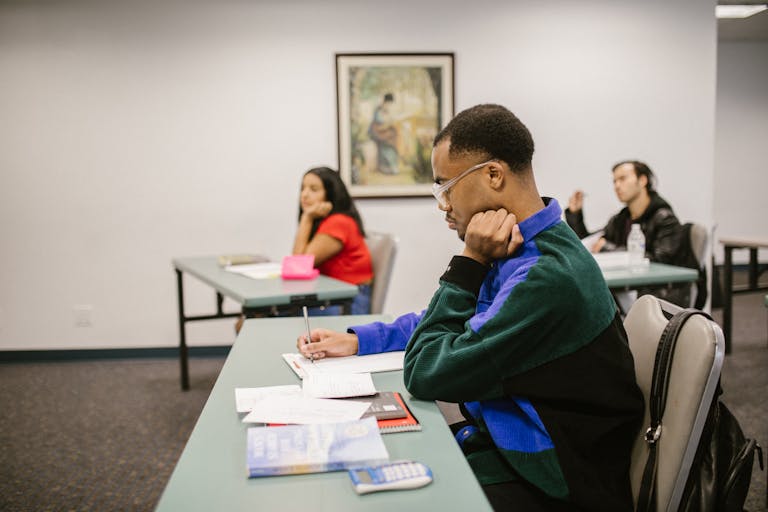So you’ve assigned your first group project and thoroughly explained the requirements to your students and you now want to make sure that your students are productive and efficient. Fortunately, there are a few things that you can do to facilitate the interaction and progress of each group.
1. Raise The Bar
Before assigning the groups, it’s important to set the tone for the quality of work you expect from students. Raise the bar high, and your students will meet it and possibly exceed it. Set the bar too low, and you’ll be disappointed with the quality of your students’ work, and they’ll never really know what they are truly capable of achieving. Never make the mistake of assuming that a student’s socio-economic background, age, or cultural background will prevent them from achieving spectacular results if they are properly trained and prepared by you.
Impress on the students the importance of the project they are about to embark on and what they will learn from it. Clearly explain to your students that you have very high-standards and that you expect them to exceed these standards. It helps to show students what you mean by all of this.
There are two things that you can do to help you make the point:
- Show them: I usually keep copies of the best projects that were ever created in my classes. I share them with my current students, and I describe what made these projects exceptional. I then inform the students that I expect their project to be even better. Since my projects include a portfolio and presentation, I share copies of the portfolios, and I show students video clips of some of the presentations and the behind-the-scene work that went into producing them. Where did the video come from? I video recorded my students myself using a camcorder. I’d recommend purchasing an inexpensive HD camcorder with a mic input of possible, but if that’s not within your means or budget, your smartphone will suffice for now.
- Describe Quality Work: I expect my students work to be:
- Professional
- Accurate
- Consistent
- Competitive
I spend a few minutes going over each of those bullet points and explain what they mean to me. I define each bullet and elaborate on what the students can do to implement these things in their project. You can present points on a list of “dos” and “don’ts” if it helps you clarify things.
2. Greet and Meet
Once you’ve assigned the groups, instruct your students to form a circle and then greet each person in their group and introduce themselves. This shouldn’t take more than 5 minutes. Yes, I realize that they’re not children, but even adult college students need to be directed. Especially when they find themselves surrounded by a group of people who they may not really know and are expected to work with and evaluate at the end of the project.
3. Communication Protocol
Once the pleasantries are over with, have each student pull out a piece of paper and write their name, email address, and phone-number on it. Once done, they will each need to pass that paper to the person sitting on their right. The person who receives the paper will add their name and contact details to the list and pass it on. The idea is to make sure that every person in the group ends up with a list of all of their group members and their contact information.
Have the group discuss and agree on a primary mode of communication and frequency. In addition to email and phone, encourage the students to meet in-person outside of class and utilize available free technology such as Google Hangouts or Skype. It’s too easy and convenient not to take advantage of.
I find that my student population isn’t very tech savvy beyond texting, which is why I typically either demonstrate the use of technology that they can use or I’ll provide a link to a YouTube video that does that for me. Most of my classes are hybrid classes, so once I’ve assigned the groups, I will create group forums on Moodle (the learning management system that my school uses) to provide a space where students can post their progress, exchange files, and solicit feedback from team members.
4. Talent Inventory
Now that the students know who is in their group and how to get in touch with them, it’s time to figure out what talents, skills, and expertise each person brings to the group. Ask the group to conduct a talent inventory.
Have each student share what talents, skills, or expertise they possess. Even if they do not think it is related to the class or project. Give students a few examples such as the ones below to get them started:
- Internet research
- Artistic talents
- Graphics design
- Use of specific software: Sketch-up, AutoCAD, PhotoShop, Ai, POS, etc…
- Math skills: costing/pricing/calculations
- Organizational skills
- Culinary skills: recipe creation, food production
- Communication Skills: public speaking, presentations
- Entertainment: singing, dancing, etc…
Yes, even knowing that someone can sing and dance is helpful. I once had a student group that developed an Italian restaurant (concept-to-creation), which meant they had to conceive of a business theme and develop and run the business by the end of the semester. One of the group members happened to be in the college choir. Her singing talent although unrelated to the class became the live entertainment for the restaurant the students had developed. She delivered a beautiful rendition of ‘A Vucchella.’
The talent inventory serves two purposes:
- It allows students to know what talent and skills are available to the group.
- And more importantly, it gives the students an opportunity to get to know one another on a more personal level.
5. Leader Nominations
By now, the groups have gotten a chance to hear from everyone and a sense of who is on their team, but they do not have anyone to guide or direct their group, which is why they need to select one person to serve as a group manager. If necessary, allow up to one week for the group to select a manager. However, in smaller classes where the students know each other, this may be done on the same day that the group is assigned.
It is important for you to provide the students with some of the qualities that they should be looking for in their group manager. Be very clear about the fact that this isn’t a popularity contest and that their decision will have a direct impact on the performance of the group and their individual grades.
Have the students look within the group for someone that possesses most or all of these qualities:
- Enthusiasm
- Positive-outlook
- Organized
- Respectable & Honest
- Dependable
- Consistent
- Open-minded (flexible, democratic)
- Accessible when needed
- Able to keep the group focused and on track
I specifically have the students reflect on the behavior of each of their group members over the prior weeks to help them with their decision. I remind them that someone who is regularly late, absent, and does not complete or turn in assignments would make a poor leader.
6. Schedule
Before moving forward, have the students pull up their schedules and agree on several days and times when they can get together and meet to work on the project. Depending on the school that you work at, this may be a piece of cake, or this could be the biggest complication that the group encounters. At my school, this is one of the biggest challenges my students face. Everyone commutes. Many of my students work, some are part-time students, some are full-time students, and it is virtually impossible for the entire group to get together outside of class time.
To address this problem, I allocate no less than 4 classes where the students are able to work with their groups. Additionally, I have the students meet with as many people as they can from their group and keep the ones who are not able to meet in the loop with reports. I also encourage students to try to rearrange their schedule if possible.
7. Measurable Deadlines
It is important for the group to have something very specific to work on during the first week. They already know what the project is about because you have already given it to them with the requirements and details. But what is next? Where do they go from here? Starting can be difficult for some students, so provide them with specific things that they can work on together as a group within the next week. The group should expect to report on the progress of each measurable item you ask them to work on.
Here’s a sample of measurable things that I expect from groups within the first week:
- Select a manager.
- Select a name for the group or project.
- Clearly define the Business/Project concept.
- Division of labor. Each group member must have a clearly defined position (job title) and task(s).
- Provide a detailed schedule of all tasks/duties
- Select a location for the business and complete the demographics research to support the location choice.
- Question: What challenges has the group faced within the first week?
- Question: How do you plan on approaching these challenges, if any?
- A weekly list of task deadlines that will help the students move through the project with focus.
8. Follow-up & Feedback
Be sure to follow-up with every group and ensure that they are meeting their weekly deadlines. Provide feedback and offer guidance, but refrain from hovering too long and do not micromanage.
Remember that your students and the work that they produce are a reflection of you. So, what do others see when they look at your students and the work that they produce? How does it make you feel?
So, to recap, the 8 things that you need to do when managing group projects are:
- Raise the bar
- Meet and greet
- Communication protocol
- Conduct a talent inventory
- Nominate a group leader
- Schedule
- Set measurable deadlines
- Follow-up and & feedback
If you found this post useful, I’d be grateful if you’d help spread the word by sharing this with friends or colleagues on LinkedIn, Facebook, Twitter, Reddit, or any other social media platform you use.




